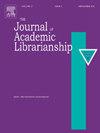人工智能的采用、认知和阿拉伯学术图书馆员的道德素养:一项调查
IF 2.3
3区 管理学
Q2 INFORMATION SCIENCE & LIBRARY SCIENCE
引用次数: 0
摘要
该研究探讨了阿拉伯学术图书馆如何采用人工智能(AI),并从阿拉伯学术图书馆馆员的角度考察了人工智能伦理考虑的意识。它采用基于调查的方法,在17个阿拉伯国家的48个学术图书馆采用滚雪球抽样技术。研究工具是一份基于网络的问卷,共收到272名参与者的回复。调查结果显示,37.5%的受访者表示他们的图书馆使用了人工智能,其中编目和生成元数据是43%的图书馆最常用的应用程序。该研究强调了阿拉伯学术图书馆采用人工智能面临的几个挑战,包括缺乏必要的基础设施和员工培训。此外,约81%的阿拉伯学术图书馆员认为,知识产权和版权是人工智能最重要的道德考虑因素。然而,只有12%的参与者报告说他们在图书馆工作中遇到了与人工智能使用相关的道德问题。结果表明,阿拉伯学术图书馆采取的主要行动是提供关于人工智能伦理的面对面或在线研讨会和讲习班,并通过其网站提供与学术诚信相关的道德考虑和资源。该研究建议阿拉伯学术图书馆组织适当的培训计划,以提高员工的人工智能素养,为人工智能的采用开发必要的基础设施,并准备相关的政策文件,以指导人工智能技术的道德使用。本文章由计算机程序翻译,如有差异,请以英文原文为准。
Artificial Intelligence adoption, perceptions, and ethical literacy among Arab academic librarians: A survey
The study explored how Arab academic libraries are adopting artificial intelligence (AI) and examined the awareness of AI ethical considerations from the perspectives of Arab academic librarians. It utilized a survey-based approach, employing a snowball sampling technique across 48 academic libraries in 17 Arab countries. The research instrument was a web-based questionnaire, which received responses from a total of 272 participants.
The findings revealed that 37.5 % of respondents indicated that their libraries use AI, with cataloging and generating metadata being the most common applications used by 43 % of libraries. The study highlighted several challenges to AI adoption in Arab academic libraries, including a lack of necessary infrastructure and staff training. Moreover, about 81 % of Arab academic librarians believed that intellectual property and copyright are the most important ethical considerations regarding AI. However, only 12% of participants reported having encountered ethical issues related to AI use in their library work. The results indicated that the primary actions taken by Arab academic libraries were offering face-to-face or online seminars and workshops on AI ethics, as well as providing ethical considerations and resources related to academic integrity through their websites. The study recommended that Arab academic libraries organize appropriate training programs to improve AI literacy among staff, develop the necessary infrastructure for AI adoption, and prepare relevant policy documents to guide the ethical use of AI technologies.
求助全文
通过发布文献求助,成功后即可免费获取论文全文。
去求助
来源期刊

Journal of Academic Librarianship
INFORMATION SCIENCE & LIBRARY SCIENCE-
CiteScore
5.30
自引率
15.40%
发文量
120
审稿时长
29 days
期刊介绍:
The Journal of Academic Librarianship, an international and refereed journal, publishes articles that focus on problems and issues germane to college and university libraries. JAL provides a forum for authors to present research findings and, where applicable, their practical applications and significance; analyze policies, practices, issues, and trends; speculate about the future of academic librarianship; present analytical bibliographic essays and philosophical treatises. JAL also brings to the attention of its readers information about hundreds of new and recently published books in library and information science, management, scholarly communication, and higher education. JAL, in addition, covers management and discipline-based software and information policy developments.
 求助内容:
求助内容: 应助结果提醒方式:
应助结果提醒方式:


